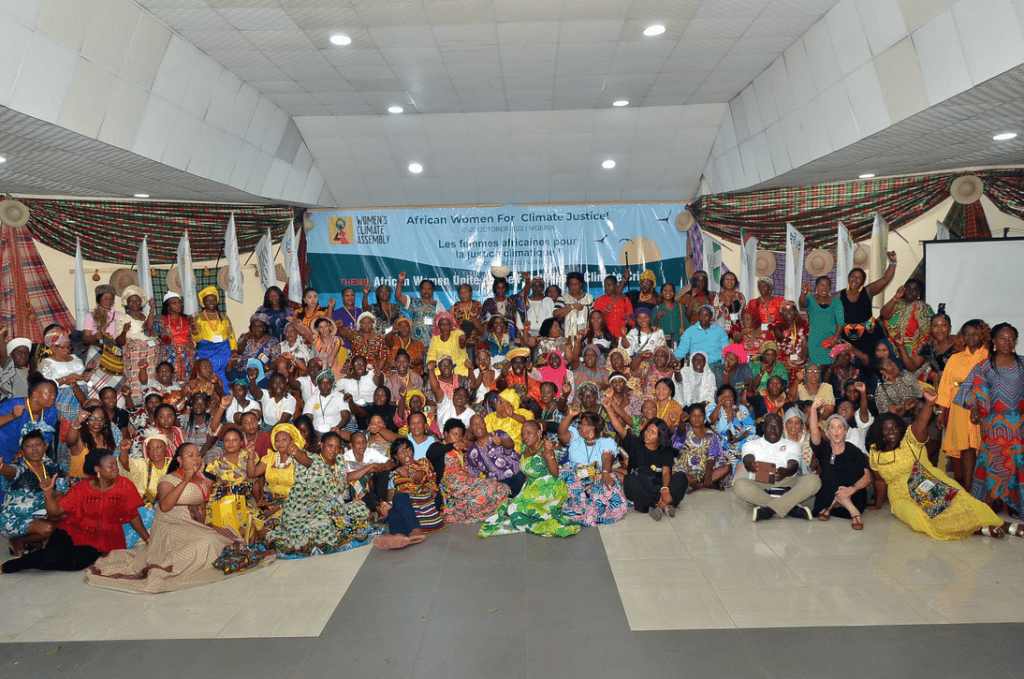The voices of 150 African women resonated loudly at the second Women’s Climate Assembly 2023 (WCA), where participants from 17 countries across Central and West Africa converged in Lagos, Nigeria, to learn and share more about their linked struggles. The gathering brought together women under the banner, ’African women unite for climate justice, reparations, and development alternatives!’ In the face of an escalating climate crisis, it is African women, who are mostly-disproportionately impacted, yet their voices and struggles often go unheeded and side-lined by governments, multinational corporations and elites, who put profit before people and the planet.
Fabian Nsemeke of the Kebetkache Women Development and Resource Centre and Connie Nagiah of the WoMin African Alliance informed that Africa is warming faster than the global average, from deadly floods in West Africa, droughts and famine in East Africa to devastating cyclones in Southern Africa, the climate emergency calls for drastic action, if we are to avoid carbon emissions breaching 1.5 degrees of climate warming. No longer will women accept being mere spectators to the global crisis deeply affecting their lives and livelihoods. Instead, they are actively engaged in radical resistance against destructive mining and extractives, mega projects such as hydro dams, monoculture farming, land grabs, and the continued exploitation and pollution of our ecology and natural resources. This new ‘scramble for Africa’s’ mineral wealth and resources places a heavy burden on women, especially, who produce crops for their families and for the market, have to walk far and often perilous journeys to fetch water, and live with the continued and ruthless extraction of resources to countries in the Global North, the statement said.
With the support of a few non-governmental organisations working in solidarity with community women and a steering group of women’s movements and grassroots networks, the assembly provided a crucial political space for women from Benin, Burkina Faso, Côte d’Ivoire, Cameroon, the Democratic Republic of Congo, Ghana, Guinea Conakry Kenya, Liberia, Mali, Mozambique, Nigeria, Senegal, Sierra Leone, South Africa, Tanzania, Uganda, and Zimbabwe. They participated in various activities including teach-ins, political education workshops, song and poetry to poster and banner making. Participants exchanged knowledge, amplifying the voices of their communities to support and mobilise women-led movement building and strategies, and development alternatives, from an extractivist economic model to a just, people-centered one.
To lift up the voices of women and frontline communities, the assembly joined the third African People’s Counter COP 2023, hosting an online session on green colonialism, as part of the people’s assemblies. The two parallel events sought to shine a spotlight on Africa and provide a much-needed platform for their collective struggles, and share solidarity with communities across the continent in the fight for climate justice. “We are asking for them to change the system. We cannot live in this climate – everywhere is hot, there is a lot of sickness, we can no longer survive. Our plants are dying, our animals are dying. We need to change things and tell them, leave our climate alone! With the Counter COP, we will make COP into a space that serves us. A space where we can put our demands forward and to ensure that the voices of communities are front and centre”, said Oumou Koulibaly from Senegal.
Ahead of the upcoming COP28 in Dubai in November, which has been captured by corporate polluters lobbying for their vested interests, pushing false solutions like Net Zero and greenwashing their dirty oil and gas activities on the continent, the voices of Africans must be front and centre of the discussions for it is Africa and its people who benefit least from the pillage of its natural wealth. From rising food insecurity, climate refugees, economies downscaled, and a growing humanitarian crisis, it is time for the polluters to pay their historical debt for the loss and damages that Africa has felt most acutely.
“We need to talk to the polluters for the problems they are causing in our communities. Everywhere you turn, there are problems. After maybe six to seven years, you’ll hear about equity, but we are still here. We need to wake up and do something as women! When we sit there, they will talk over us. We need to wake up and do something that will bring justice to us”, Abie Freema from Liberia had said. Emerging from the assembly proceedings participants issued a declaration with their demands for climate justice, reparations, and development alternatives. From the success of last year’s inaugural assembly in Port Harcourt, Nigeria, it is now a permanent assembly where women can continue to build together and forge a new future that brings to the fore, the powerful resistance of Africa women organising for a just, healthy, and equitable future for all, Nsemeke and Nagiah added.

